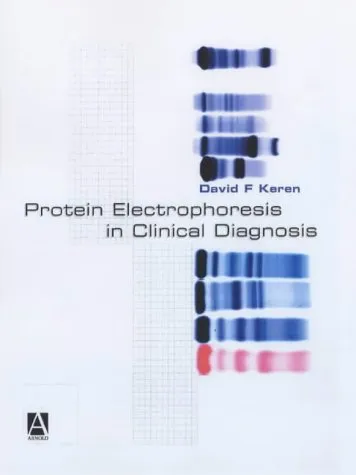Protein Electrophoresis in Clinical Diagnosis
4.5
Reviews from our users

You Can Ask your questions from this book's AI after Login
Each download or ask from book AI costs 2 points. To earn more free points, please visit the Points Guide Page and complete some valuable actions.Related Refrences:
Introduction to "Protein Electrophoresis in Clinical Diagnosis"
Welcome to "Protein Electrophoresis in Clinical Diagnosis", a comprehensive and authoritative guide designed to bridge the gap between scientific expertise and practical application in the field of protein electrophoresis. Authored for medical professionals, laboratory scientists, and researchers, this book provides an in-depth examination of one of the most vital diagnostic tools in modern medicine. Whether you are a seasoned practitioner or a beginner seeking clarity on the subject, this guide delivers relevant, reliable, and practical knowledge that enhances your understanding of protein electrophoresis.
Protein electrophoresis is an essential laboratory technique used to assess a wide range of diseases and conditions, including multiple myeloma, chronic inflammation, liver pathologies, and more. This book not only explains the science behind electrophoresis but also provides practical guidance on interpreting results, troubleshooting techniques, and understanding the clinical significance of findings. Through detailed descriptions, case studies, and expert insights, it enables practitioners to make more informed decisions that directly impact patient care.
Detailed Summary of the Book
"Protein Electrophoresis in Clinical Diagnosis" offers a balanced approach, combining academic knowledge with real-world applications. It begins with a conceptual overview of electrophoresis, covering its physical principles and methodologies. As readers progress through the chapters, they are introduced to advanced topics like immunofixation, capillary electrophoresis, and the interpretation of complex electrophoretic patterns.
The book takes a methodical approach to the clinical utility of protein electrophoresis, focusing on how to identify, verify, and interpret serum and urine protein abnormalities. It includes extensive discussions on the identification of monoclonal gammopathies, understanding polyclonal patterns, and diagnosing hereditary as well as acquired conditions based on protein expression. For those in clinical practice or research, this book provides contextually relevant use cases, diagnostic algorithms, and simplified interpretations to empower decision-making processes.
- Introduction to the scientific principles of electrophoresis and related techniques.
- Comprehensive explanation of serum and urine protein electrophoresis testing.
- Expert analysis of abnormal protein patterns and their clinical implications.
- Advanced topics such as immunotyping and capillary electrophoresis for specialty testing.
- Practical troubleshooting guidelines to improve testing accuracy.
Key Takeaways
- Protein electrophoresis is crucial for diagnosing and monitoring diseases like monoclonal gammopathies, autoimmune disorders, and kidney dysfunction.
- High-quality interpretations of electrophoretic results improve diagnostic accuracy and ultimately benefit patient outcomes.
- Understanding common errors and troubleshooting techniques ensures better laboratory and clinical practices.
- The adoption of advanced techniques, such as capillary electrophoresis, enhances testing precision and versatility.
- Practical guidance on integrating electrophoresis findings with other clinical markers reinforces comprehensive patient evaluation.
Famous Quotes from the Book
"Electrophoresis is not just a test—it is an essential lens through which clinicians can observe the subtle biochemical signatures of disease."
"Interpreting electrophoretic patterns is an art as much as it is a science—one that demands precision, expertise, and an understanding of context."
Why "Protein Electrophoresis in Clinical Diagnosis" Matters
This book is more than a text—it is a resource that addresses the needs of healthcare professionals striving for excellence in diagnostic medicine. In a time when precision medicine is increasingly emphasized, protein electrophoresis represents a cornerstone of accurate diagnosis for various conditions. This guide provides readers with the competence and confidence to interpret results, improve diagnostic workflows, and apply findings in a clinical context.
Moreover, the book’s clarity and accessibility ensure that technical details are easily understood, making it suitable for audiences with varying levels of expertise. By emphasizing real-world applications, troubleshooting guidance, and clinical decision-making, "Protein Electrophoresis in Clinical Diagnosis" becomes an invaluable tool for healthcare teams striving for better patient outcomes.
This book matters because it empowers practitioners to leverage protein electrophoresis not just as a supportive diagnostic tool, but as a critical means of understanding complex disease states and tailoring individualized care.
Free Direct Download
You Can Download this book after Login
Accessing books through legal platforms and public libraries not only supports the rights of authors and publishers but also contributes to the sustainability of reading culture. Before downloading, please take a moment to consider these options.
Find this book on other platforms:
WorldCat helps you find books in libraries worldwide.
See ratings, reviews, and discussions on Goodreads.
Find and buy rare or used books on AbeBooks.
1250
بازدید4.5
امتیاز50
نظر98%
رضایتReviews:
4.5
Based on 0 users review
"کیفیت چاپ عالی بود، خیلی راضیام"



